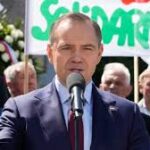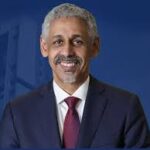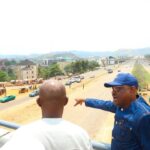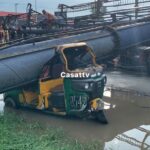The President of the ECOWAS Commission, Dr. Omar Alieu Touray, has described the Dangote Petroleum Refinery as a powerful symbol of hope for Africa’s industrial future, calling it a clear demonstration of what the private sector can achieve in driving regional economic transformation.
Touray made the remarks during a high-level visit by an ECOWAS delegation to the 650,000 barrels-per-day refinery located in the Lekki Free Zone, Lagos. The facility, Africa’s largest single-train refinery, is poised to meet the region’s energy needs and boost intra-African trade.
“What I have seen today gives me great hope,” said Touray. “Anyone who doubts Africa’s potential should visit this refinery. It embodies the kind of vision and commitment that can change the continent’s industrial landscape.”
Touray was accompanied by top ECOWAS officials including Commissioner for Infrastructure, Energy and Digitalisation, Sediko Douka; Commissioner of Internal Services, Prof. Nazifi Abdullahi Darma; Director of Private Sector/SME, Dr. Tony Luka Elumelu; and his Chief of Staff, Hon. Abdou Kolley.
He praised the refinery’s capacity and technology, noting that its compliance with Euro V fuel standards—meeting a 50 parts per million sulphur limit—positions it as a key player in helping West Africa move away from substandard fuel imports that pose environmental and health risks.
Touray also called for stronger collaboration between governments and the private sector, urging policymakers to listen directly to industrialists like Aliko Dangote and shape policies based on the realities they face.
“As ECOWAS marks its 50th anniversary, we are more committed than ever to engaging the private sector,” he said. “We must stop making decisions in isolation. Visits like this allow us to understand their challenges firsthand and find ways to support them.”
He stressed the need for a regional industrial strategy to address youth unemployment, poverty, and insecurity, saying, “Only the private sector can deliver the scale of impact required. Governments must create an enabling environment to help them succeed.”
Touray assured Dangote Group of the Commission’s support in expanding access to ECOWAS markets and urged other countries to emulate Nigeria by investing in infrastructure that benefits the entire continent.
In response, Aliko Dangote, President of Dangote Group, led the ECOWAS team on a guided tour of the refinery and shared the journey behind its development. He reaffirmed his stance that Africa must break free from overreliance on imported goods to achieve economic sovereignty.
“As long as we import what we can produce, we will remain underdeveloped,” Dangote said. “This refinery proves we can build for ourselves to global standards.”
He dismissed doubts about the refinery’s capacity to meet regional demand, stating that the facility is equipped to serve not only Nigeria but the wider West African region.
Dangote highlighted the impact the refinery is already having on local prices. “When we began diesel production last year, we slashed the price from N1,700 to N1,100. Today, it’s even lower. That price drop has had significant ripple effects across mining, agriculture, and other sectors.”
He also pointed out that petrol prices in Nigeria are far lower than in neighbouring countries, thanks to local refining. “While countries around us pay an average of N1,600 per litre, our price is between N815 and N820. Nigerians may not realise it, but they are paying just 55% of what others in the region pay.”
Hinting at future plans, Dangote said more initiatives are underway to ensure Nigerians reap maximum benefits from the refinery.
“This refinery is built for Nigerians, and they will continue to enjoy the advantages of local production,” he said, reaffirming the company’s commitment to enhancing energy security and reducing dependency on imports.
Nzubechukwu Eze









